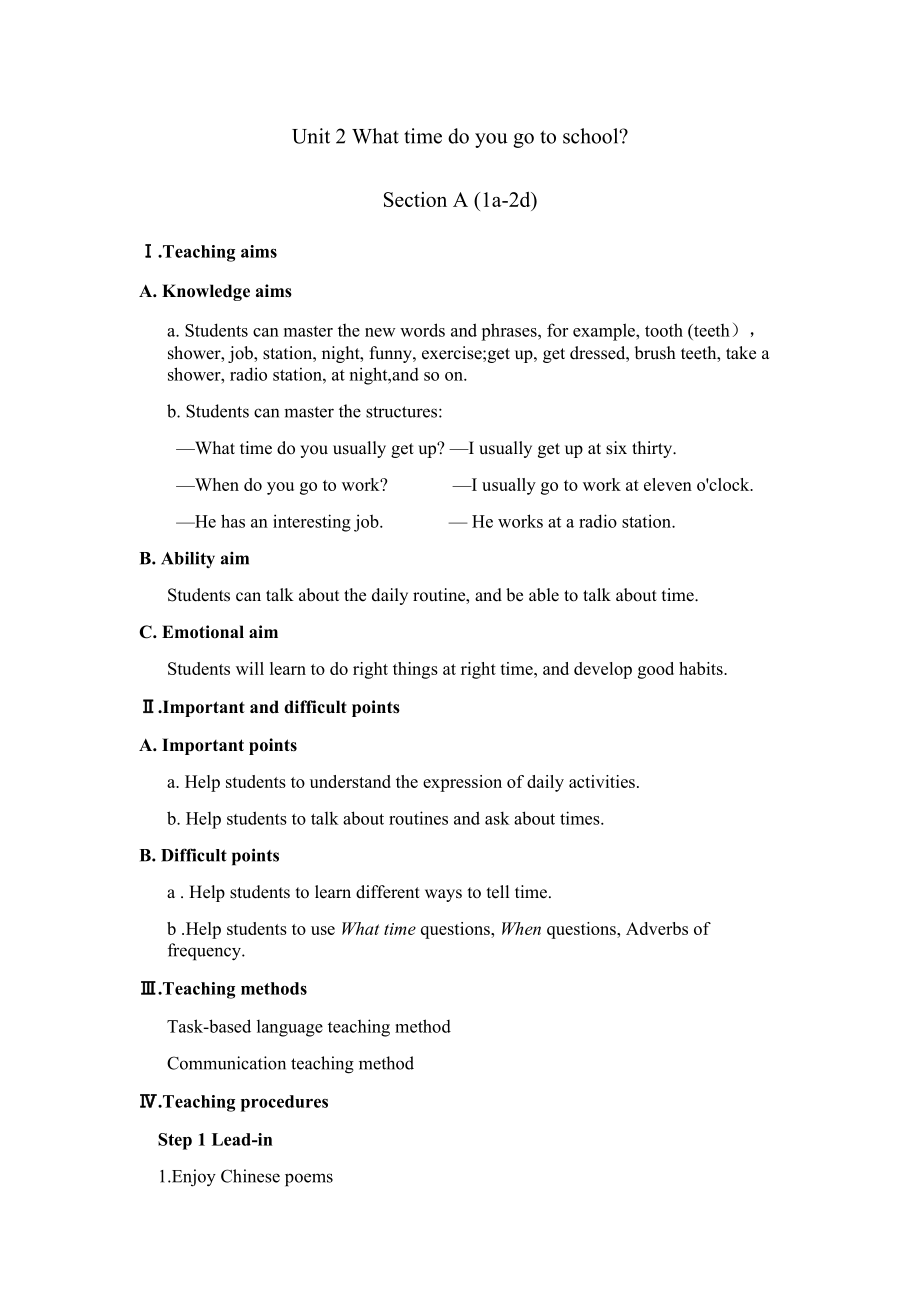《人教版七年級(jí)英語(yǔ) 下冊(cè)Unit 2 What time do you go to school教學(xué)設(shè)計(jì)》由會(huì)員分享�,可在線閱讀,更多相關(guān)《人教版七年級(jí)英語(yǔ) 下冊(cè)Unit 2 What time do you go to school教學(xué)設(shè)計(jì)(3頁(yè)珍藏版)》請(qǐng)?jiān)谘b配圖網(wǎng)上搜索����。
1、Unit 2 What time do you go to school?
Section A (1a-2d)
Ⅰ.Teaching aims
A. Knowledge aims
a. Students can master the new words and phrases, for example, tooth (teeth)�,shower, job, station, night, funny, exercise;get up, get dressed, brush teeth, take a shower, radio station, at night,and so on.
2�����、
b. Students can master the structures:
—What time do you usually get up? —I usually get up at six thirty.
—When do you go to work? —I usually go to work at eleven o'clock.
—He has an interesting job. — He works at a radio station.
B. Ability aim
Students can talk about th
3����、e daily routine, and be able to talk about time.
C. Emotional aim
Students will learn to do right things at right time, and develop good habits.
Ⅱ.Important and difficult points
A. Important points
a. Help students to understand the expression of daily activities.
b. Help students to talk a
4�����、bout routines and ask about times.
B. Difficult points
a . Help students to learn different ways to tell time.
b .Help students to use What time questions, When questions, Adverbs of frequency.
Ⅲ.Teaching methods
Task-based language teaching method
Communication teaching method
Ⅳ.Tea
5���、ching procedures
Step 1 Lead-in
1.Enjoy Chinese poems
Time flies.
Time is money.
Time tries all.
Time tries truth.
Tomorrow comes never.
2.To know the time
T: What’s the time?
S: It’s...
Then make a summary and practice it.
Step2 Pre-listening (1a)
1.Free talk.
T: Do you have a G
6�����、ood time management?
S:Yes/No...
T:What's your Daily Routine? What time do you usually...?
S: I usually...at...
2 .Match the activities with the pictures and then check the answers together.
Step3 While-listening (1b)
Listen and match the times with the actions. Draw lines from the clocks to
7�、the pictures.
Step4 Post-listening (1c)
Pair work. Student A is the interviewer. Students B is Rick. Ask and answer questions about Rick’s day.
Step5 Pre-listening
1 .Let’s think:
Any questions about Rick's Morning Routine? Anything different?
Culture: morning shower or evening shower
8�、 Different lifestyles: Shower in the morning makes you feel awake and engergetic all day and you smell good. Shower in the evening makes you fall asleep faster and it's good for your skin.
2 . prediction
Look at the picture in 2a, and describe the picture.
Step6 While-listening (2a-2b)
1
9、 .Listen to the conversation and complete the sentences.
2 .Listen again and complete this shower schedule for Jim's family.
Step7 Post-listening (2c-2d)
1 .Now talk about yourself according to your time schedule.
2 .Role-play the conversation.
Read the conversation and answer the questions:
10���、
①Who is he?
②Where does he work?
③What's the interview mainly about?
Step8 Summary and homework
Summary: I will guide students to summarize this class: we have learned six daily activities and how to tell time.
Homework: Students will make a timetable of their good friend, and make a report of their homework.
 人教版七年級(jí)英語(yǔ) 下冊(cè)Unit 2 What time do you go to school教學(xué)設(shè)計(jì)
人教版七年級(jí)英語(yǔ) 下冊(cè)Unit 2 What time do you go to school教學(xué)設(shè)計(jì)

